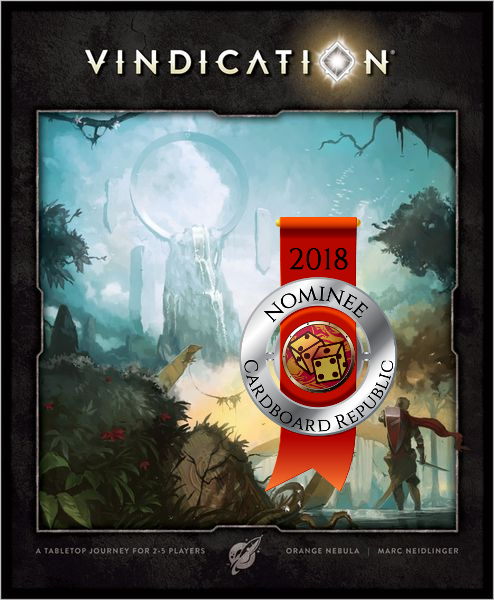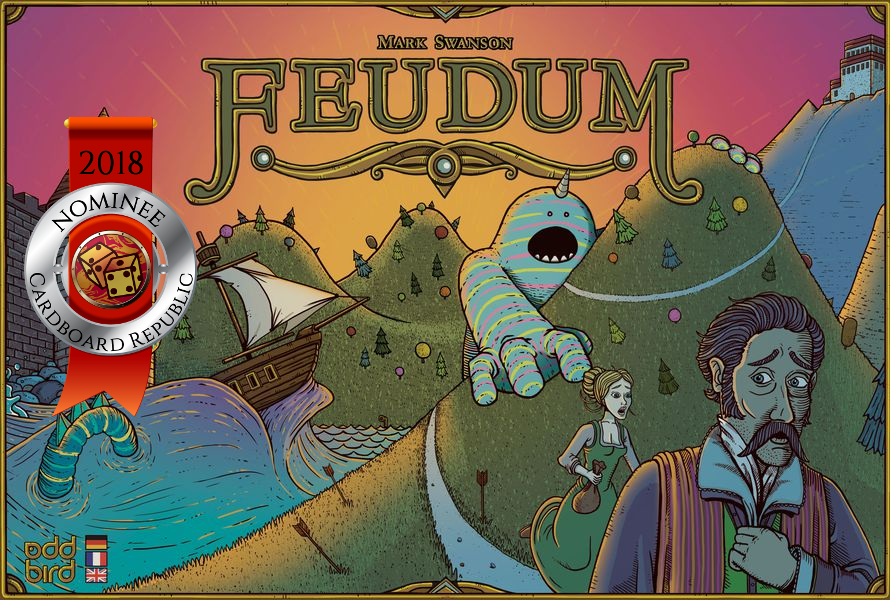The Cardboard Republic has rolled out the annual Laurels of the Republic awards, celebrating the best new games released in 2018 for each of the gamer archetypes. What follows are the finalists for one of those groups.
 Always the penultimate gamblers, Daredevils like living on the edge. This group adheres to the idea of high risk and high reward, never letting a silly thing like failure get in their way of possible victory – or a good time. That said, this group doesn’t avoid or dislike strategy either. Rather, they’re just far more willing to take chances for a better payoff, be it on the battlefield or the board room. Essentially, Daredevils like to win, but they want to do it on their terms. They adore games giving them a wide variety of options to cross the finish line, and if they have to embrace a bit of luck to accomplish that, then so be it!
Always the penultimate gamblers, Daredevils like living on the edge. This group adheres to the idea of high risk and high reward, never letting a silly thing like failure get in their way of possible victory – or a good time. That said, this group doesn’t avoid or dislike strategy either. Rather, they’re just far more willing to take chances for a better payoff, be it on the battlefield or the board room. Essentially, Daredevils like to win, but they want to do it on their terms. They adore games giving them a wide variety of options to cross the finish line, and if they have to embrace a bit of luck to accomplish that, then so be it!
And with that, here are The 2018 Laurel Finalists for Daredevils:
Honorable Mention: No Honor Among Thieves
Publisher: Carpe Omnis Games | Players: 3-6 | Play Time: 90-120 Minutes
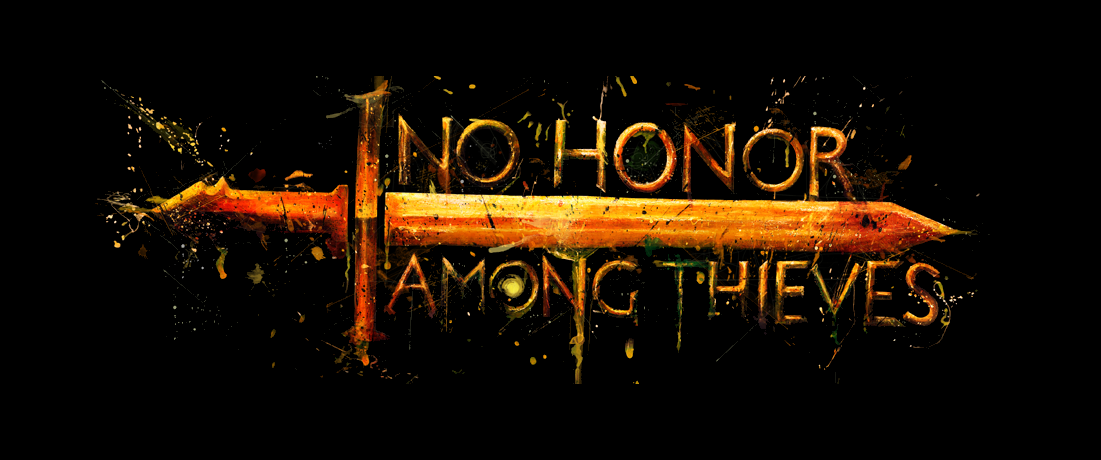
Games of backstabbing and betrayal are not for everyone. They generally exist at a strange cross-section where strategy meets social engineering. These games don’t just hint at embracing a bit of moral flexibility in order to succeed – they often require it. And if not everyone is on board with that style of conniving and duplicity, it can leave someone with a negative experience.
Essentially, these games are at their best when everyone is at their worst.
That is the tumultuous landscape you find yourselves in with the aptly named No Honor Among Thieves, a game where coin trumps loyalty and loyalty is cheap. In it, each player is the head of a band of thieves looking to unburden wealthy and privileged denizens from their many riches in the quest for more gold. However, despite your handful of specialized characters and your own secret objectives, going all Robin Hood on your marks will be far too difficult for one team alone. Thus, much of the game consists of forming temporary alliances with other players on individual heists, agreeing on how to divvy up the loot, and then seeing which among you will inevitably betray one another for a bigger cut.
Ocean’s 11 this is not.
From an outside perspective, NHAT behaves not unlike a 90 minute game of Munchkin (also known as a game of Munchkin), with players scheming to build up their cast of assistants, stockpiling as much loot as possible, and magnanimously offering to help a player one moment before screwing them over a short time later. However, No Honor is more nuanced, more cerebral, and it carefully balances the necessity for temporary arrangements to propel the game forward with the reality that no one can be trusted. In a world where everyone is a band of scurrilous thieves, no one’s reputation – or purse strings – are safe. Decisions in this game can be thoughtful or whimsical, pragmatic, or capricious, and where risk and opportunity are completely intertwined. And it’s almost entirely player-driven. All of which makes an ideal setting for Daredevils to embrace their inner rogues.
The Nominees

Number Five: Empires of the Void II
Publisher: Red Raven Games | Players: 2-5 | Play Time: 90 Minutes
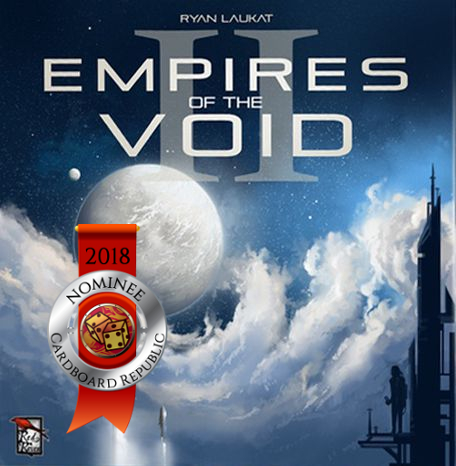 When it comes to settling the far reaches of space, every story states that humans did so because they were finally able to, or because they were forced to. In the fiction around Empires of the Void II, it is very much the latter.
When it comes to settling the far reaches of space, every story states that humans did so because they were finally able to, or because they were forced to. In the fiction around Empires of the Void II, it is very much the latter.
With Empires II: More Empires, Earth was met with a surprise alien attack that made it neigh uninhabitable, and in a last-ditch effort, the last humans piled into a Worldship for a distant sector of space. Upon finally arriving, though, it turns out the same thing has happened to several other species. And so, in that spirit of camaraderie, these disparate ragtag groups banded together for a more peaceful, prosperous future.
Just kidding. They all decided to rebuild and everyone else is merely getting in the way.
In this tightly contested 3X game, each player is commander of an alien species looking to increase their grip of power in the sector. Utilizing a Lead-Follow system of turn-taking, players plod and plot their way to success by use of a handful of different actions, including moving and conquering planets, using resources to build settlements and research technologies, recruit units to your cause, and expend action cards to, among other things, build up political influence with the various native species of the planets everyone is dead-set on taking over. Every area in the game provides a means of accumulating points, and when time runs out, the one whose efforts have been the most fruitful will emerge victorious.
Empires isn’t as deep or as expansive as your typical 4X, which would normally give this group pause. Yet what drives its larger appeal to Daredevils is experimenting with making a deep commitment into one area of focus to see how that fares against the larger whole. Skip combat and go pure diplomacy? Only construct one building type? Let’s see what happens! EV2 possesses all of the artistic and thematic wonder that is the typical hallmark of a Red Raven production, and though more constrained, there’s still enough space to see if a galactic gamble will pay off.
Number Four: SEAL Team Flix
Publisher: WizKids | Players: 1-4 | Play Time: 45-120 Minutes
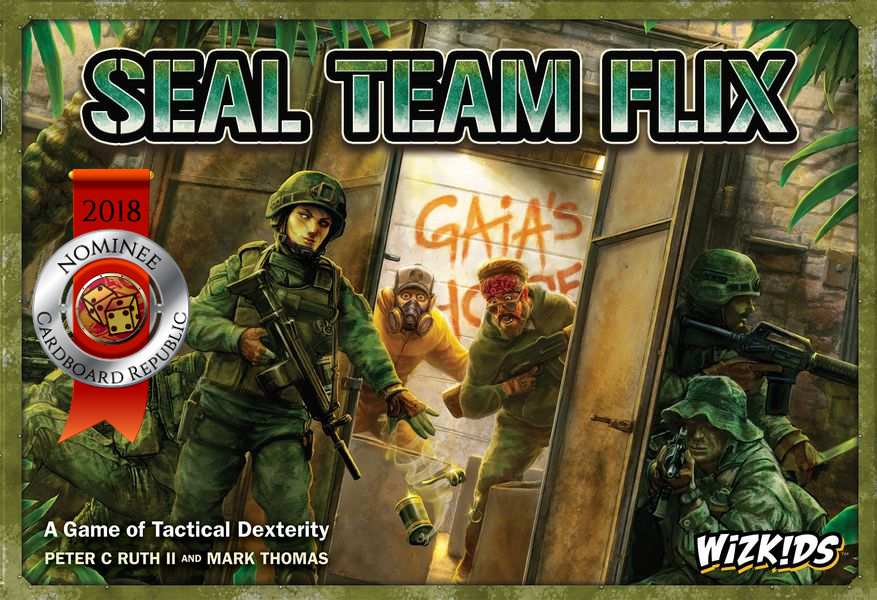 First off, full props to the name. We appreciate decent wordplay, and if these awards were based on that, SEAL Team Flix would easily walk away the winner.
First off, full props to the name. We appreciate decent wordplay, and if these awards were based on that, SEAL Team Flix would easily walk away the winner.
As for the game itself, SEAL Team Flix is what you’d get by mashing Flick ‘em Up together with Call of Duty. The result is a cooperative, team-oriented tactical game where players are an elite squad of soldiers tasked with tracking down and eliminating a nefarious group of eco-terrorists over the span of multiple scenarios.
Except, well, it’s dexterity based.
Which gives new rise who the whole concept of a trigger finger, really.
The objectives in each mission of STF vary, but your general goal, naturally, is to accomplish them without running into too many problems. Missions can range from neutralizing targets to rescuing hostages, to defusing bombs. Everything you’d expect from a standard tactical-laden military op style game, including – at least on the surface – the same air of seriousness befitting the theme.
That said, it’s hard to take anything too seriously when the primary mechanism of the game is to plink items around various scenario maps. Which is ultimately where a lot of this game’s entertainment value comes through.
SEAL Team Flix is built upon the incongruity between the rigidity of military op games with the lighthearted irreverence of a dexterity-laden flicking game, with expectedly amusing results. While the game both exhibits and rewards tactical thinking, group planning, and accurate execution, it also sets itself up for its own subversion when combat is determined by flicking disks and the capability of taking the occasional risky moves to accomplish your tasks.
SEAL Team Flix isn’t a serious game brought low by its lighter dexterity mechanics but is instead a dexterity game with a larger sense of purpose. This game’s strange-yet-solid pairing of ideas is challenging, unconventional, and although full of structure, still leaves a fair amount of room for the need (or desire) to take those often needed calculated risks. Which is why many Daredevils will have their sights set on this one.
Number Three: Vindication
Publisher: Orange Nebula | Players: 2-5 | Play Time: 45-150 Minutes
How much hype a game gets is hard to predict ahead of time, largely because of how many variables go into fostering hype to begin with. From the timing of its release, to the individuals behind designing and publishing it, a game’s buzz isn’t determined by one single factor. Nor is that hype universally applied across the entirety of the consumer game market.
Case in point: enter Vindication, a much hyped game that you’ve probably never heard of.
Vindication first came onto the scene via a highly successful Kickstarter, enticing people with its amalgamation of mechanics into an intriguing strategic puzzle just waiting to be experienced. Blending action selection, area control, modular setups, resource management, and tableau building, Vindication felt like it was throwing a bunch of stuff into a mixer to see what would come out. Impressively, not only did it work: it worked exceedingly well.
Vindication starts with you being tossed overboard, a punishment for your years of being a terrible person, and you wash ashore on a strange, deserted island. Your desire in the game is to seek redemption of sorts by doing deeds to regain your lost honor. Each turn consists of just three actions: moving, activating a character, and activating a nearby tile. Yet within this simplicity lies a sprawling web of option and opportunity. Not only does the order of your actions open up diverse choices, but many actions require specific combinations of resources and conditions to unlock even more powerful gameplay rewards. Whether it’s exploring the island itself, finding relics, recruiting allies, defeating monsters, or growing as a character, Vindication has no shortage when it comes to the scope of different permutations each playthrough can take. And it’s hard to resist its zest for discovery.
Then there’s Vindication’s endgame, in which the more players accumulate VP, the higher the possibility that additional endgame triggers are revealed, which can cause things to end rather abruptly. Which just may be the most Daredevil thing in the game.
Vindication is ambitious, incredibly replayable, and provides abundant room for players to decide for themselves how their path to redemption will shake out. For this group, there is no better prospect for an island adventure than that.
Number Two: Feudum
Publisher: Odd Bird Games | Players: 2-5 | Play Time: 80-180 Minutes
Feudum is one of those games that has seemed to polarize most gamers since it first burst onto the Kickstarter scene with its bright colors, eye-catching artwork, breadth of decision options, and admittedly challenging initial rules barrier. Because either you really enjoy the game’s open-ended nature and sparsely placed strategic guiderails, or you really, really don’t.
Given its inclusion on this group’s list, it’s sort of obvious where Daredevils fall on that argument.
Feudum’s grand adventure begins with your banishment – so you’re off to a good start. The noble king has disappeared on an expedition, and the queen, in her ruthless quest for riches, has asserted her status by robbing you of yours. Your goal over the course of the game is to reclaim as much honor as possible in these new lands and maybe, just maybe, find your own way back to prominence.
How you go about accomplishing that in this odd new place, however, is largely up to you. And it is that degree of experimentation and exploration that places Feudum squarely on this list.
Over the span of several scoring Epochs, players perform a number of rounds, which is largely driven by action selection cards. Each round has you secretly choose four of nearly a dozen different action cards to use, which are then resolved one at a time. These actions allow you to take a dizzying array of different opportunities, depending on your current whims and ambitions. From recruiting and fighting with units, to moving and exploring around the board, to amassing or improving territory, the number of pathways to produced points are as wide-ranging as the land itself. This also includes ingratiating yourself with the game’s numerous powerful guilds, which use a push & pull resource mechanism to further aid your quest for fame and glory.
With excellent production quality and artwork, Feudum presents an impressive sandbox-style game to peruse on your own terms. Whether it’s harvesting for resources to trade, investing in an epic voyage, or marauding around raiding other opponent’s territories, the decision of how you’d like to regain your renown is entirely in your own hands. A claim for which Daredevils will eagerly be interested in testing.
Thanks to everything Feudum offers, it did particularly well in earning its runner-up status. But in the end, the title that edged it out is one a bit shorter more straightforward, if equally unpredictable…
The Winner
2018 Daredevil Laurel – The Quacks of Quedlinburg
Publisher: North Star Games | Players: 2-4 | Play Time: 45 Minutes
In a category all about risk and reward, this one was a pretty sure bet.
2018 was a banner year for designer Wolfgang Warsch. Among his six releases included the similarly nominated game The Mind and this endearing push your luck potion-maker. From the moment The Quacks of Quedlinburg was released it has enjoyed a steady stream of praise, up to and including winning the 2018 Kennerspiele thanks to its rewarding tactile bag-building nature and the litany of ways you can simultaneously mitigate the influence of luck whilst accumulating points.
At their heart, most push your luck games are bound by the rather binary question: “Should I stop or not?”. From that foundational decision, all manner of creative and enjoyable ideas are built in order to ensure the game is accessible, replayable, and unique. The trick to making a push your luck game memorable is finding ways of giving that simple decision some weight to it without destroying the underlying risk/reward dynamic.
Quacks does this effortlessly. Almost annoyingly so.
In Quacks, each player is a charlatan posing as a doctor. Your goal over nine rounds is to accumulate as many points as possible by creating a secret (if ineffectual) brew to sell to unsuspecting customers. Each round you continue to pull ingredient chits out of your bag until you either stop or you pull out too many bad ones and bust. The longer you can press your luck and move around your circular cauldron board increases the amount of points you score and determines how much money you have to spend on advanced ingredients that help the extend the potency of your brew in a variety of ways.
What makes Quacks so appealing, even a tad addicting, is that despite its variation of ingredients and their effects, the game never deviates from what makes it so enjoyable in the first place: gambling over when to strive for more money and points, or when to play safe…and then ensuring that you never want to play it safe. It’s straightforward, engaging, and allows you to experiment with a host of ways to make your concoction ever more powerful. For Daredevils, Quacks is an intoxicating potion practically tailor-made for them, easily and rightfully earning this group’s Laurel.
![]()
The Quacks of Quedlinburg Contest!
We thought about different ways to highlight the how great the winning title of the Daredevil Laurel is. We wanted to do something delicious and unpredictable, but too many of our suggestions proved to be too dangerous, expensive, or had us winding up covered in feathers. (It’s a long story.) To avoid costly bills, investigations by the FDA, and much to the dismay of Daredevils everywhere, in the end we opted for the most direct approach: providing one lucky winner with the opportunity to enjoy the award-winning game first hand. So let’s get to it!
That’s right! Enter below for your chance at your very own copy of The Quacks of Quedlinburg!
Note: In honor of their award recognition, North Star Games has kindly provided a copy of this game for giveaway purposes.
Be sure to check out the 2018 Laurel Award pages for the other archetypes once they go live!

